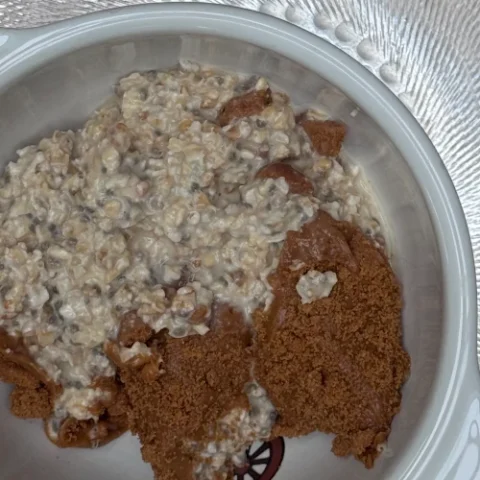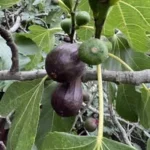
Biscoff Overnight Oats with Protein – Creamy and Delicious
Try this indulgent Biscoff overnight oats recipe packed with protein, fibre, and flavour. Perfect for a quick vegan-friendly breakfast on busy mornings!
Ingredients
- 1/2 cup certified gluten free oats
- 1 tsp chia seeds
- 1/2 scoop vanilla protein powder
- 1/2 cup almond milk
- 1/4 cup Lotus Biscoff spread
- 1 Lotus Biscoff biscuit
Instructions
- Add all oat ingredients to a bowl or mason jar. Stir well and refrigerate for a minimum of one hour.
- Melt Biscoff Spread and pour over prepared oats. Crumble a Biscoff biscuit around the edges. Then, put it back in the fridge overnight to set.
- In the morning, grab and go!
Nutrition Information:
Yield: 1 Serving Size: 1Amount Per Serving: Calories: 529Total Fat: 15gSaturated Fat: 3gTrans Fat: 0gUnsaturated Fat: 11gCholesterol: 4mgSodium: 421mgCarbohydrates: 75gFiber: 10gSugar: 6gProtein: 25g
Biscoff Overnight Oats – The Delicious Story Behind the Famous Spread
Biscoff overnight oats combine creamy oats, plant protein, and the irresistible caramelised flavour of Belgium’s most beloved biscuit. But beyond being a dreamy breakfast, the story of Biscoff is one of sweet success, quirky origins, and a global love affair that started in a tiny bakery.
The Sweet Story Behind Biscoff: From Belgian Bakery to Global Sensation
Few spreads have taken the world by storm quite like Biscoff. Known for its caramelised sweetness and unmistakable spiced crunch, Biscoff has become a household name, delighting everyone from coffee lovers to dessert enthusiasts. But behind the jar of that golden-brown spread lies a fascinating story of humble beginnings, clever marketing, and a truly unique flavour profile.
The Origins of Biscoff
Biscoff originated in Belgium in the 1930s, created by a small family bakery called Lotus Bakeries in the town of Lembeke. The name “Biscoff” is a combination of biscuit and coffee — a nod to its original purpose as the perfect companion to a cup of coffee. In Belgium and across much of Europe, the biscuit is more commonly known as the Lotus Speculoos, a traditional spiced shortcrust biscuit made with brown sugar and a blend of warming spices such as cinnamon and nutmeg.
By the 1950s, Biscoff biscuits had become a café staple across Belgium. The company’s clever strategy of individually wrapping the biscuits and distributing them with coffee orders helped the brand achieve widespread recognition. This small but clever act of pairing – biscuit and coffee – soon became an iconic duo.
Biscoff’s Expansion: From Europe to the World
Biscoff’s international breakthrough came in the 1980s when Lotus Bakeries expanded into the United States. American coffee culture was booming, and Biscoff found its place as the “Europe’s favourite cookie with coffee,” even becoming a regular treat served on Delta Airlines flights — a move that introduced millions of passengers to its unique flavour.
In the early 2000s, the brand took an innovative leap: transforming the biscuit into a creamy Biscoff spread. Inspired by a recipe created by a Belgian fan on a reality TV show, Lotus turned the idea into a global product. The spread retained all the flavour of the biscuit but added a smooth, spoonable texture that could be used in baking, breakfasts, and desserts — like your Biscoff overnight oats.
Today, Biscoff products are sold in over 50 countries, from Europe and the US to Australia and Asia. Its distinctive caramel-spice flavour has even inspired everything from Biscoff-flavoured ice creams to vegan cheesecakes and lattes.
Fun Facts About Biscoff
- The Original Recipe Is a Secret: Much like Coca-Cola, the exact blend of spices and ingredients used in Biscoff is closely guarded.
- Airline Fame: Biscoff gained cult status when it became the in-flight snack on Delta Airlines in the 1980s.
- Vegan by Nature: Traditional Biscoff biscuits and spread are naturally vegan, making them a popular choice for plant-based recipes.
- Social Media Star: On TikTok and Instagram, Biscoff recipes — from cheesecakes to milkshakes — have amassed millions of views, solidifying its status as an internet food sensation.
Nutrition: Sweet Yet Surprising
While Biscoff is often seen as a treat, it’s not all indulgence. The biscuits are lower in fat than many traditional cookies, and they’re free from artificial colours and preservatives. However, they’re still relatively high in sugar, so moderation is key.
A tablespoon of Biscoff spread contains around 88 calories and 5 grams of fat, making it comparable to nut butter — though with more sugar and less protein. When paired with ingredients like oats, chia seeds, and plant-based protein (as in your overnight oats recipe), it becomes a balanced option that combines slow-release carbs, protein, and a comforting sweetness.
Why Biscoff Pairs Perfectly with Overnight Oats
The caramelised, spiced notes of Biscoff bring warmth and depth to the creamy texture of overnight oats. When mixed with oats, plant milk, and a touch of protein powder, it transforms into a dessert-like breakfast that’s both nourishing and satisfying. The combination of fibre from oats and plant protein keeps you fuller for longer — perfect for athletes, busy mornings, or anyone craving a nutritious indulgence.
More Ways to Enjoy Biscoff
Once you’ve tried these Biscoff overnight oats, you might enjoy exploring other recipes featuring the same star ingredient:
- Spread Biscoff on a Banana Bread
- Biscoff Energy Balls
- Black Forrest Overnight Oats
For external inspiration, check out:
- Lotus Biscoff Official Website – explore their full range and story.
- How Biscoff Cookies Became the Snack We Crave on Planes



